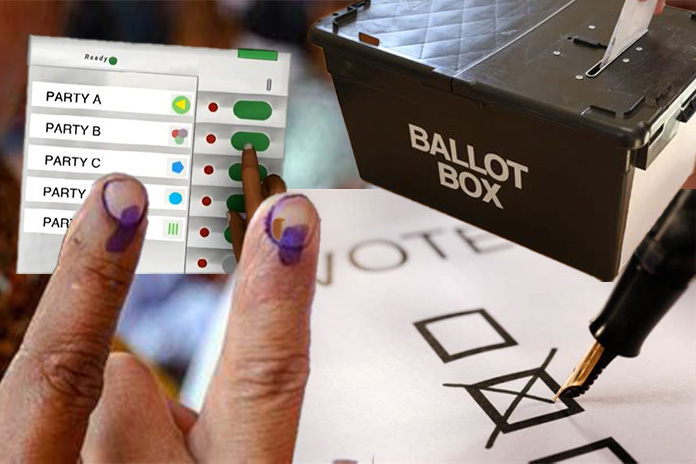
THIS year, about half of the world’s adult population (4.2 billion people) will cast a vote.
In 65 countries, the citizens will participate in this electoral ritual, which is meant to renew our faith in the democratic process.
Africa and Asia will have their fair share of elections in 2024.
In Africa, elections will be organised in 16 states, including South Africa and Tunisia.
In Asia, citizens will have their say in 15 countries and the world will pay close attention to the votes in India, Pakistan, Indonesia and South Korea.
Surprisingly, in Africa, Asia, Europe, and beyond, the discussion around this electoral overdose is not infused with hope and optimism, but rather with apprehension.
Democracy is at stake in the 2024 US election, a Chatham House analysis states, encapsulating the angst that has come to define the world’s key political moments.
Elections Are More Than Just About Voting
Perhaps this approach to the 2024 elections is not wrong. We have numerous examples worldwide, including in Africa and Europe, illustrating that elections have become coronation moments for populist leaders, political forces, and ideas.
In this context, the new normal is that populists can win a significant number of votes and often have the chance to govern, in coalition or alone, thus implementing their exclusionary policies. From this standpoint, never since the end of the Cold War has liberal democracy (and democracy more generally) been more contested. One cannot deny the facts.
However, we, as believers in the liberal democratic norms, have agency and a choice to make: Either we give up and hope for the best or we try to redefine the situation in our favour.
The malicious use of Artificial Intelligence and technology, culture wars, disinformation, and even cyberattacks will be on the menu in this year’s elections.
We should not assume that illiberal forces will become complacent. We can expect the worst in this super-electoral year.
The key question is how to act and react.
Better Communication
My argument, as a strategic communication specialist, is straightforward. In addition to the classical art of great campaigning, we should invest in better preparation, so that we can get a keener sense of what is coming against us, and emphasise more sense, sensibility, and simplicity in our communication. Easy to say and hard to do, but let’s give it a try.
In newer and older democracies alike, the dynamics of electoral victories are intricately woven into the tapestry of votes, where success hinges on resonating with the emotions and convictions of the electorate. Voting, as a consequential act, taps into the emotional domain, making the art of framing a crucial strategy for political engagement.
The Art Of Framing
Framing, a concept integral to the political landscape, centres on highlighting the fundamental essence of an issue, steering away from its intricate details.
Rooted in the media’s ability to direct attention and provide context, framing plays a pivotal role not only in politics but also within organisational dynamics.
Specifically, framing theory asserts that the presentation of information, or ‘the frame’, shapes how individuals process it, exerting a profound influence on how news is perceived.

Leaders in Africa and Asia, serving as both tone-setters and role models, hold the power to shape interpretations of critical issues. The framing of challenges, such as economic problems and poverty, can significantly impact public perception.
A skilful frame might shift the focus onto voters’ immediate concerns, underscoring that mere expressions of patriotism are inadequate when fundamental issues persist. This strategic alignment of poverty with nationalism serves as a powerful reframe, steering the narrative in a direction that resonates with the electorate.
Shaping Views
Beyond influencing perceptions, framing plays a critical role in distorting and shaping views of reality. In the Asian and African political landscapes, where progress and challenges are deeply intertwined, framing becomes an essential tool.
The political competition is essentially centred around framing and reframing. When the electoral choice is between clear ideological alternatives, framing and reframing are the main tools in defining the political situation.
When the ideological differences are less stark, the elections are about competence, and framing and reframing operate as key elements in presenting to the public the credentials of the main competitors.
As frames act as filters for the mind, controlling the information conveyed, it becomes imperative to recognise their elusive nature.
In African and Asian politics, where economic measures are discussed, effective framing may redirect conversations toward social or systemic issues, offering a different perspective.
However, the stubborn nature of frames, resistant to change, poses a challenge. Emotional attachments to frames, common in the region, make altering them a perceived threat.
This is why I often say that politics is about RED: it starts with the economic, political, and social reality (R) but is finally shaped by emotion (E) and strategic and policy decisions (D).
ALSO READ: One Splendid Night In Pop History
Viewing Through Framing
While framing is used by political entrepreneurs to spin the tale, one could naturally ask how the public interprets framing.
The first thing to mention is that framing is not a silver bullet in political and strategic communication, especially when the citizens are exposed to counter-framing. Not only context matters, but also people’s predispositions and background, which can generate a heterogeneous reception of the message. So, a persuasive frame depends on very good segmentation and targeting.
For the public to become better informed (and not manipulated), the key point is a diverse media diet, with exposure to different perspectives being able to break the negative impact of echo chambers.
In conclusion, the distinctive political landscape of Asia and Africa demands adept utilisation of framing strategies. From aligning issues with national sentiments to navigating the complexities of progress, effective framing in these regions requires not only skill but an acute awareness of its impact on perceptions.
As democratic forces navigate the intricate political terrain of Africa and Asia in 2024, their success will undoubtedly hinge on their ability to employ framing and reframing techniques to effectively shape and reshape the narrative, ultimately winning the hearts and minds of the electorate.
The views expressed in this article are those of the author, Radu Magdin, a global consultant and trainer, and former Prime Ministerial adviser in Romania and Moldova. He worked for 5 years in Brussels, in the EU arena, from 2007 to 2012.





















